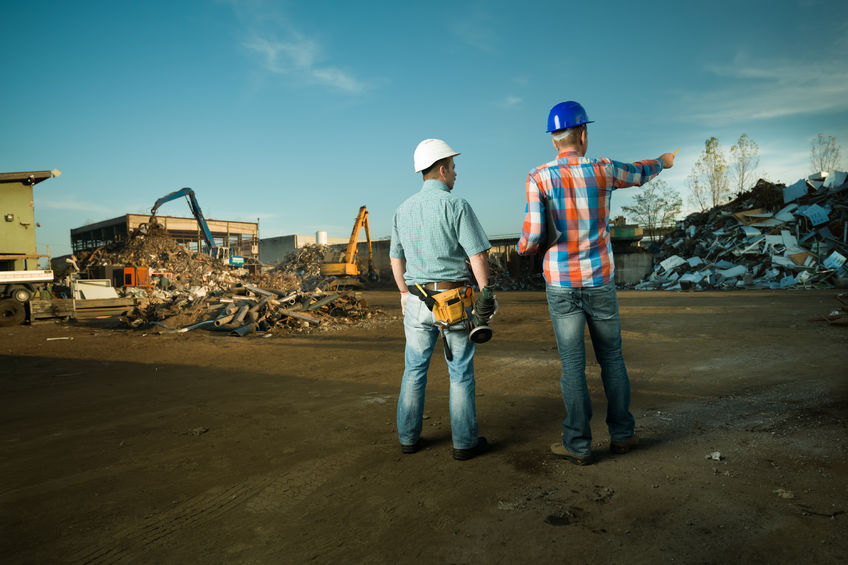The Scrap Metal Dealer's Reputation is Vital to the Recycling Process
From the earliest uses of scrap metal thousands of years ago to today’s high tech uses, scrap metal recycling is dedicated to transforming scrap materials into new products that drive the economy by making the old, new again. In fact, nonferrous metals, such as aluminum, copper, lead, nickel, tin and zinc are some of the materials that do not degrade or lose their chemical or physical properties in the recycling process. As a result, they have the capacity to be recycled an infinite number of times.
A scrap dealer's reputation is vital in the recycling process. That’s why the police partner with scrap dealers and require strict record keeping with regards to their transactions. It’s common practice for both dealers and customers to establish legitimacy to one another. By ensuring that the scrap dealers you work with are reputable through some checks and balances, you will reduce the chances of theft, while maximizing your payout.
1) Require identification before the transaction
The need to require identification is a mainstay in scrap dealing circles. Every person or business that does business in the scrap metal industry will be required to prove who they are. Depending on the state, the rules vary but in general, state issued identification should be asked for and information recorded as part of the transaction process. If the scrap dealer doesn’t need this information in order to do business, be wary and consider using another business to be safe.
2) Certifications
Certifications are important in the metal and recycling industry to ensure companies have quality control measures, workplace safety processes in place and standards for how material are recycled. Though not all scrap dealers will have these certifications, it is important that they all work with ISO or R2 Certified facilities in the processing of scrap materials.
In doing so, you can have peace of mind that the materials are being responsibly recycled. You will have an audit trail, if necessary, in the event of a superfund or a company that may send material overseas where it is buried and/or not recycled responsibly.
- ISO 9001 compliance and certification
- ISO Certified 14001 facility
- R2 (Responsible Recycling) Certification for Electronic Waste Recycling
The group known as the International Organization for Standardization (ISO) certifies businesses based on having an approved quality management system. Many businesses, including scrap dealers, find value in becoming ISO 9001 certified. Designed as a Quality Management System (QMS), ISO certifications demonstrate a company’s ability to provide products and services on a consistent basis as well as meet customer and regulatory requirements, according to AQ, the leading global network for quality certifications.
It’s a good start to get a quality certification, but obtaining facility certification will add further legitimacy. When a scrap metal dealer has certified their facilities, in essence they are letting customers know that they have taken the necessary measures to ensure that their process is environmentally responsible. IOS (ISO.org) explains that the 14001 certification family focuses on specific approaches such as audits, communications, labelling and life cycle analysis, as well as environmental challenges. Once a customer has a handle on the type of scrap metal they collect and or generate, they can be assured that an ISO certified dealer or processor will responsibly recycle the materials and protect the environment at the same time.
R2 certification is more than just certification for recycling, it’s about the social responsibility of recycling end of life electronics to protect people, the environment and data, while preserving our earth’s valuable resources. This distinction is serious business to the R2 Technical Advisory Committee that develops and implements the policy for how used and end-of-life electronic components, materials and equipment is recycled. Spearheading responsible recycling efforts is a cooperative of stakeholders including the U.S. Environmental Protection Agency (EPA), state governments, manufacturers, recyclers, trade groups and non-governmental organizations.
3) Educational resources are provided
There are many types of metals and metal alloys. A reputable company will gladly provide valuable information to the consumer about the makeup of the scrap metal, recycling options, value of the material and any other questions they may have. Typically a sample of the material is needed to test and determine the assay of the material. In addition, business websites, printed marketing materials, and social media engagement serve as a way to educate consumers. Examples include subscription based publications such as The American Metal Market, Peony and The Scrap Post. Scrap dealers build confidence with their customer base by being a knowledgeable resource and staying on top of trends, best practices and changes in the industry.
4) Business credentials
Customers have every right to confirm the legitimacy of a scrap dealer including documentation of their business credentials. The credentials required vary depending on local, county and state regulations and requirements. Certifications, licenses, insurance and other business related documents can be shared, referred to on a website or customers can be given contact information of the granting agency for verification.
5). Honesty and transparency
In the end, it's about relationship and reputation. It is essential to work with a scrap dealer that is honest, provides a fair payout for materials, keeps detailed records of where materials are being recycled, and won’t hesitate to provide their customers with the necessary proof they need to ensure they’re doing business with a company that is environmentally responsible and follows industry rules and regulations.
Sources:
ISRI Fact Sheet - The Scrap Recycling Industry: Aluminum, Copper, and Other Nonferrous Metals
ISRI Fact Sheet - The Scrap Recycling Industry: The Original Recyclers
https://sustainableelectronics.org


